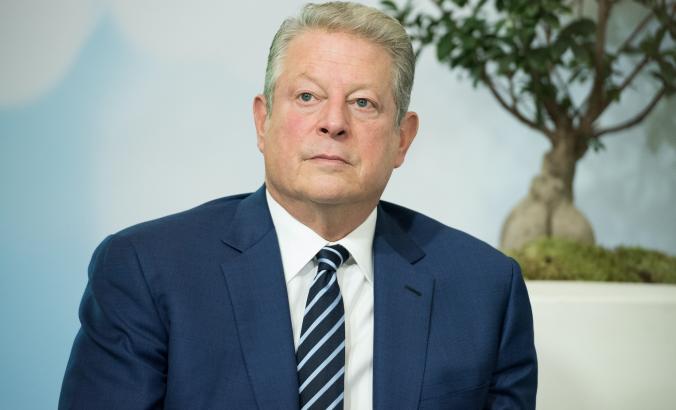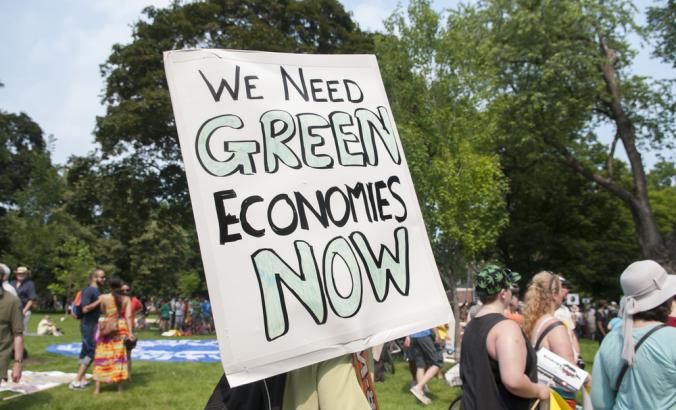How Asia Pulp & Paper learned to put down the chainsaw

For more than a decade, few companies have experienced worse environmental press than Asia Pulp and Paper. The company may have been one of the largest suppliers of paper and pulp products in the world, but it had also become an environmental pariah, synonymous with forest destruction in Indonesia and Southeast Asia and the target of numerous high-profile Greenpeace campaigns.
Buton Feb. 5, to the surprise of green NGOs and businesses around the world, APP published a new "森林保护政策," committing categorically to an immediate and permanent halt of all logging in natural forest areas. Crucially, the new strategy was wide-ranging and detailed, covered both APP and its supply chain, and included a commitment to third-party monitoring carried out by not-for-profit The Forest Trust. Perhaps most important of all, it also had the endorsement of the company's longtime tormentors, Greenpeace.
Last week, BusinessGreen Plus sat down with Aida Greenbury, managing director for sustainability and stakeholder engagement, and Scott Poynton, executive director of The Forest Trust, to discuss how this genuinely historic transformation came about and ask, if even APP can see the light and embrace sustainability, why can't all firms?
BG+: When was the decision taken to halt deforestation of natural forests and can you tell us a little bit about the process behind that decision?
Aida Greenbury:很多人认为这是三个月,六个月或者一年计划的结果。事实上,这是一个多年的过程。早在2010年,我们就收到了很多利益相关者的意见,我们意识到我们的可持续发展计划还不够好。我们需要有一个明确的目标来实现我们的目标。早在2010年,我们就推出了可持续发展计划的初稿。我们并没有对此大惊小怪,因为这是一个活的文件,将不断改进。我们在2010年启动了这项计划,其中包括温室气体排放目标和其他一些目标以及森林保护等。然后我们自己看了看,并与我们的一些利益相关者分享,我们意识到,“这还不必威体育2018够好,是吗?”
We showed it to Scott [Poynton] in 2011 and he just said, "What are you trying to do here? You are trying to rebuild trust. Well, there's a big elephant in the room you've totally ignored." And we said, "You're absolutely right." We realized there was a huge gap in our initial draft sustainability plan, and that was that our roadmap did not address the major calls from civil society. It was tiptoeing around it, and that wasn't good enough, it wasn't going to get us anywhere.
But at that time in 2011 I don't think we were ready to address the calls from the NGOs head-on, because simply we did not know what it would mean. We did not know what it meant to stop deforestation. We were not sure we could do that. Our business is about conversion: converting land into plantation, and then making pulp and paper out of it. We couldn't understand how to do what the NGOs wanted us to do. We didn't understand what the impact to our operations would be if we did what they wanted us to do.
BG+: How did you come to that understanding?
Greenbury:That was the moment when we looked at our sister company, Golden Agri Resources, the palm oil company. They were already working with Scott and TFT at the time and they had just launched their policy. We talked internally to the company and its shareholders about the impact on operations. That was when we decided we needed to engage with The Forest Trust.
BG+:目前绿色和平给企业带来了多大的痛苦?有顾客抵制——我想当你开始失去销售时,这对公司来说是非常真实的吗?这是决定改变可持续发展政策的主要驱动因素吗?必威体育2018
Greenbury:There was a mixture of elements. The customers, the NGOs, the management of APP and the shareholders of APP -- those four elements were all key to the massive change in our sustainability strategy.
It was tough for us at the time when Greenpeace launched reports and attacked us and launched boycotts -- it was very tough for us. It was hard for us to understand and realize what they said might be true, we were slightly in denial. We were trying to justify what we were doing, but looking back without them doing that we wouldn't be here. It was important.
BG+: So you've reached a point were you are almost thanking Greenpeace for the protests and the boycotts?
Greenbury:不差一点,我们要感谢他们。我们公开表示,我们感谢绿色和平组织在帮助我们改变战略方面发挥的作用。
你可以问斯科特。他是这里的局外人,我在公司工作了10年,但他是一个局外人,观察了整个过程两年。
斯科特·波因顿:公司内部经历了一段真实的旅程。当我们终于在2月5日宣布,我对其中一位股东说,遗憾的是,两年前我们第一次见面时,会议进行得并不顺利,当时经历了两年的痛苦和磨难,本来可以避免的。但她说,“你知道吗,我们当时还没有准备好,我们不清楚我们需要做什么,我们认为我们做的事情是正确的,绿色和平组织是不公平的。我们花了这段时间才达成协议,并了解我们需要做什么。”
APP is a big operation, a complex operation, where if you stop doing that there it could have an impact over here. There were a lot of unforeseen things that could have happened, a lot of nervousness about that. But I think what we have been able to do with APP since we started to engage with them in February 2012 is not only spend my time in the head office engaging with the senior management team, but also have the field teams out in the bush getting data. They were able to say, "If you did that, this would be the impact." They were starting to be able to make forecasts and plan into the future based on solid information.
APP本身就有一些数据,这并不是说他们没有信息,但是我们可以说,“你的数据是对的”,或者“你可能会这样做,结果会是这样的。”因此,我们在雅加达讨论的政策过程中,技术团队之间有很多互动,他们对政策过程感到厌烦。
BG+:这一政策进程如何发展到可以承诺结束所有毁林的地步?
Greenbury:2012年6月,我们推出了我们的路线图和负责任的采购政策。这项政策已经具备了一切条件,包括高保护价值森林(HCVF)、高碳储量(HCS)合规性,以及整个九码。但我们缺少了一些东西:我们并没有真正在整个供应链中实施它;我们只是在少数我们有股份的供应商身上实施它。对任何人来说都不够好。我们的供应链是我们的责任,不管我们拥有它还是不拥有它。如果他们是我们供应链的一部分,那就是我们的责任。
六月份我们一推出路线图,我们就与TFT进行了不间断的合作,以寻求加快供应链政策实施的途径,特别是在印度尼西亚、中国和其他地方。我们就是这么做的,六个月来我们都没说什么。我们在九月份提供了一个更新,但那时只有两个让步是加速过程的一部分,这还不够——我们必须百分之百地做。因此,我们与绿色和平组织进行了一些讨论,然后决定在12月停止所有天然林的转换。
Poynton:We had a meeting in early December to decide what would happen and then there were phone calls and messages to Greenpeace to tell them the decision. And then there was a meeting in Jakarta with Greenpeace Indonesia and there were some more emails and phone calls to clarify what was meant by certain clauses and to get the wording exactly right. We negotiated the agreement that would bring Greenpeace solidly to the table. We then had a videoconference call in the middle of December and agreed we would come together in January to more or less do the peace negotiation.
在那次和平谈判中——我们在一起大约两周——产生了最终政策,这意味着在1月31日之前把推土机推离土地,然后承诺处理泥炭、高碳森林和退化土地等其他实质性问题。我们希望在所有这些事情上都有明确的措辞——我们的承诺中已经暗示了这一点,但我们希望确保所有事情都非常清楚,这就是政策产生的地方。
由于路线图的下一个季度更新已经到期,所以时机非常好。它实际上应该在1月中旬发布,但是我们推迟了,因为我们希望有这样一种情况:应用程序可以去发布,而不是说推土机会在未来某个时候关闭,这是他们过去在政策上所做的——他们希望能够说,“推土机关闭了”
Greenbury:这是一个巨大的不同。在过去,我们那样做,我们错过了目标。现在很多公司仍然有某种目标,在2020年或2025年停止砍伐森林。这是他们和我们之间的区别。当我们决定停止天然林改造时,五天前就已经停止了。这不是什么目标,我们已经做到了。我们实行这项政策时,丛林里没有一把链锯伐树。这是一个非常坚定的承诺。
Poynton:There are some smaller companies in South Africa that operate just with plantations, but there is no company in the pulp and paper industry of the scale of APP that is in this position now. The companies in North America use natural forest fiber. They have got plans to get out of it, but these targets are as far away as 2025. APP are now out of it and are delinked from deforestation. There is still some wood in the bush that needs to be brought in, there is still some stock in the mill yards that needs to be processed. But effectively as of Jan. 31, APP has delinked itself from natural forest clearance.
BG+:最大的问题是你现在如何让这一承诺生效?如何确保这不会影响公司的商业生存能力?
Greenbury:在我们宣布那个消息之前已经做了很多工作。我们在生长和产量认证方面做了很多工作。TFT工作了几个月,核实我们的种植园存量,检查我们现有种植园存量的增长和产量,我们自己也做了类似的工作,并与总部位于新西兰的独立林业增长和产量专家组Ata Marie合作,核实我们的种植园。所以我们知道我们已经核实了种植园。我们知道我们有足够的种植园。是的,我们确实需要更多的缓冲,但是我们现在拥有的已经足够了,我们需要的更多可以在我们不改造天然林的地区开发。
BG+:另一个大问题是你如何执行新政策?你如何保证不再使用天然林的木材?
Greenbury:I can't guarantee. I can't guarantee smooth sailing going forward. Scott cannot guarantee that and nobody can guarantee that. We know there are going to be challenges, we know there are going to be bumps along the road, we know that. But the most important thing is we now have a process to deal with it should those challenges appear in the future.
We now have something called a grievance protocol that TFT and APP launched a few weeks ago. It's already been used. An NGO made a complaint that they thought there was some natural forest clearance still being carried out by one of our suppliers and we had our team in place to verify what was happening on the ground. We reported back to the NGO what they saw was not correct. Everything was fully transparent and the NGO was very happy the protocol had worked as planned.
BG+:你有TFT作为独立的第三方审计活动吗?
Poynton:这是正确的。这整个问题的独立third-party auditors sometimes comes up and we've had some folks say, "Is TFT independent, given APP is paying you?" Well, all auditors are paid by the client they are working with. We are a U.K.-registered nonprofit, we've been working for 14 years, we work with offices in 16 countries, we've had forests certified all around the world -- we're pretty confident in our credibility.
But we recognize some people might scratch their chin over that. So, we've got 55 people in Indonesia but they can't be everywhere all the time, so what we want is for civil society in Indonesia to act as eyes and ears on the ground. What we've said to them is, "Here is the information, here is where the forest areas are, we've got our guys going round with GPS mapping the forest boundaries where they were as of Jan. 31." We can say, "Here are the maps, please help us to ensure these areas are protected."
我认为这将是未来人们期待的新模式。我认为,独立第三方认证的整个想法已经引起了很多关注。我们看到审计人员有很多问题。但我们在这里要说的是,不要依赖某些付费的第三方,尽管我们对自己的独立性和信誉充满信心——让民间社会参与进来并加以利用。这是一个更广泛的利益相关者过程,我认为这是这个行业和许多其他行业的一个前进模式。我们需要依靠地面上的当地人来做我们的耳目。
BG+: Does APP expect a commercial upside from this commitment? Are you now in a position to go to clients who boycotted the company and ask them to come back?
Greenbury:I don't see there being a commercial upside. We are doing this because this is the right thing to do. We are doing this because we need to, there are no other options.
BG+:我并不是说试图获得商业利益是一件消极的事情。难道不存在这样一种情况:公司做正确的事情应该得到奖励吗?你现在的处境一定是你在和那些没有这样表现的公司竞争,这一定让人沮丧吧?
Greenbury:我们所说的,以及我们的主席在我们宣布这项政策时所说的,是我们真的希望其他行业参与者遵循我们的步骤。所以,如果有公司,不管他们是不是竞争对手,按照我们的步骤,我们会非常高兴。
Poynton:I think that the company, like any company, is a red-blooded organization that's interested in its business, and they do expect to get a commercial return from this, but they are not out there hunting it now. They recognize that they have to prove to the world that these policies are being implemented. It's not immediate -- the teams are out there in the bush doing a lot of work and the company will put out monthly reports on progress and keeping people posted that things are happening on the ground.
归根结底,APP是世界第二大制浆造纸公司,因为它拥有优质的产品和良好的生产成本模式。有很多公司把应用程序从他们的业务中拿出来,这让他们损失了很多钱,也伤害了他们。我怀疑会有一些公司观察这个过程几个月,然后当他们觉得月报出来了,不再有绿色和平组织的攻击,然后电话会在销售办公室响起,说:“你认为我们可以聊天吗?”因为他们会非常热衷于再次购买应用程序产品。
There are a number of pulp and paper companies in the world who have not necessarily been attacked by Greenpeace and they have benefited from people who have been exiting APP, but still having to buy paper. I suspect a lot companies are a bit nervous now, because APP was such a poster child and such a source of business for them that if APP is getting itself sorted out then clients could go back to APP. APP could make hay out of this if things go well. I believe the company did have a vision to do the right thing, they have a vision to be No. 1 in the world, but I reckon a lot of pulp and paper companies are pretty nervous right now, because while Greenpeace was beating up on APP they were winning a lot of business.
这个文章reprinted with permission from商业绿色.
Photo ofdeforestation in Indonesia由Rainforest Action Network通过Flickr。




